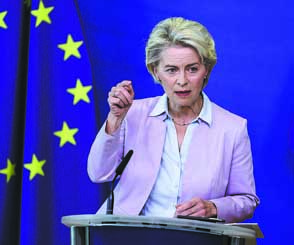Steps to get EU through energy crisis proposed
By CHEN WEIHUA in Brussels | China Daily Global | Updated: 2022-09-09 09:47

But plan for price cap on Russian gas seen meeting more resistance
European Commission President Ursula von der Leyen proposed on Wednesday five measures to tackle the energy crisis facing the European Union, though some members have already flagged their opposition to the more contentious proposals.
The measures include an EU-wide plan to cut electricity consumption, a price cap on the excess revenues made by producers of renewable and nuclear energy, a so-called solidarity contribution by fossil fuel companies from their massive profits, support for struggling utilities and a price cap on Russian gas-the latter among the most controversial.
Von der Leyen said that Russia's manipulation of the gas market has had spillover effects on the electricity market. "So there is, on the one hand, the Russian manipulation, but there are also other factors during this summer. We see the effects of climate change. We see the drought," she said.
EU energy ministers meeting in Brussels on Friday will discuss the five measures.
Germany and several other member states are believed to have varying degrees of opposition to the price cap on Russian gas.
Germany said it is "skeptical "about the idea while Hungary, Slovakia and some other member states are against the cap, according to a report by Politico.
Berlin is worried that a price cap on Russian gas might trigger retaliation by Moscow with a complete shutdown of supplies to the EU, media reported.
Hungary expressed the view that it wants any energy package to be unanimously agreed, rather than by emergency procedure with majority voting as the European Commission prefers.
Russian President Vladimir Putin on Wednesday called the price cap a "stupid" idea. He told an economic forum in Vladivostok that Russia will simply "freeze" European countries if Western nations impose the price cap.
Meanwhile, countries such as Greece, Poland, Bulgaria and Hungary want the electricity-saving measures to be voluntary, rather than mandatory as von der Leyen proposed on Wednesday.
Pipeline uncertainties
The EU has already agreed on a plan to voluntarily reduce gas consumption by 15 percent before next spring.
Concerns about the energy crisis have increased over the past week after Russian energy giant Gazprom announced it would cut the gas flow through the Nord Stream 1 pipeline indefinitely, citing an oil leak and technical problems as a result of Western sanctions against Russia.
The EU received 45 percent of its natural gas imports from Russia last year, with about 38 percent coming via Nord Stream 1.
European Council President Charles Michel told the media last week that the European Commission can't wait until von der Leyen's State of the Union address to propose solutions to the skyrocketing energy prices. "There is not a day to lose," he said.
On Wednesday, German Chancellor Olaf Scholz also called on the EU to intervene to curb gas prices.
Germany has restored the use of coal-fired power plants and is keeping the option of reactivating two nuclear power plants that were scheduled to be shut down this year.
The EU has created a joint-storage facility to tackle the energy crisis, something von der Leyen described on Wednesday as "a success story", with Europe "already at 82 percent with the joint storage". A target of 80 percent had been set for the bloc to reach by the end of October.
As European countries try to cushion the economic impact of the Ukraine crisis, US Secretary of State Antony Blinken made an unscheduled visit to Kyiv on Thursday.
In meetings with senior Ukrainian officials, Blinken said the administration of US President Joe Biden had notified Congress of its intent to provide $2 billion in long-term Foreign Military Financing to Ukraine and 18 of its neighbors, including NATO members and regional security partners.
Biden approved an additional $675 million weapons package for Ukraine, Defense Secretary Lloyd Austin said on Thursday.
Agencies contributed to this story.
























